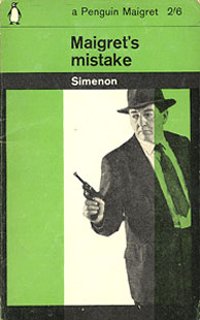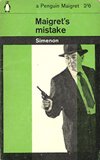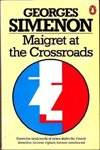
 Classics in September — Let’s proceed to Place des Vosges in Paris. Here, in a modest flat on the second floor, Commissaire Maigret lives in quiet marital harmony with his wife Henriette. She is cooking his dinner or knitting, while he dreams of growing tomatoes in retirement at his country house in the Loire valley. He knows each road, each neighbourhood of Paris, with its petty criminals, pick-pockets, small-time con artists. He understands the bouillon of intrigue and lechery which occasionally boils over into drama. There is a touch of world-weariness about this detective, yet he remains a compassionate observer of human character. He is passionate about his work, still capable of getting angry when confronted with greed and envy, but more usually taciturn, slow-moving, frequently stopping for a glass of dry white wine and for refilling his pipe. Above all, he is ‘Monsieur Normal’ – nothing showy about him, no desperately tragic backstory, no secret vices he is trying to conceal, no Sherlockian mental acrobatics, and most certainly no chasing after criminals with his loaded weapon.
Classics in September — Let’s proceed to Place des Vosges in Paris. Here, in a modest flat on the second floor, Commissaire Maigret lives in quiet marital harmony with his wife Henriette. She is cooking his dinner or knitting, while he dreams of growing tomatoes in retirement at his country house in the Loire valley. He knows each road, each neighbourhood of Paris, with its petty criminals, pick-pockets, small-time con artists. He understands the bouillon of intrigue and lechery which occasionally boils over into drama. There is a touch of world-weariness about this detective, yet he remains a compassionate observer of human character. He is passionate about his work, still capable of getting angry when confronted with greed and envy, but more usually taciturn, slow-moving, frequently stopping for a glass of dry white wine and for refilling his pipe. Above all, he is ‘Monsieur Normal’ – nothing showy about him, no desperately tragic backstory, no secret vices he is trying to conceal, no Sherlockian mental acrobatics, and most certainly no chasing after criminals with his loaded weapon.
So how can we account for Maigret’s extraordinary popularity? Georges Simenon’s detective became one of the most widely translated and instantly recognisable figure in crime fiction. So much so that Simenon began to feel jealous and bored of his creation. Only 75 of his estimated 400 published novels feature the good Inspector, but that is still many more than most detectives get in a lifetime. Usually, large quantity precludes quality, but this is not the case with Simenon: although not all of the novels are top drawer, the quality on the whole is pretty consistent.
It’s the honesty, I think, that keeps us coming back. Honest stories uncover every aspect of human nature. Often his criminals are not evil, merely weak and misguided, rather like the rest of us. The plotting is honest too – the author lays pretty much all of the cards on the table. We, the readers, are told about all the clues that Maigret finds, although we may not always follow his thought processes. And finally, there is honesty about the style too. Simenon is recommended for those learning French, because he uses a simple language, without any of the elaborate witticisms and puns that many French authors delight in. Simple, but not simplistic – every word is in its perfect place. Simenon can convey a scene with the utmost economy and yet perfectly sufficient detail.
The author deliberately kept his style low key, and is quoted as saying: “Adjectives, adverbs, and every word which is there just to make an effect. Every sentence which is there just for the sentence. Every time I find a beautiful sentence in one of my novels, it is to be cut.”
So, as you might have surmised, I am a Simenon fan. It is very hard to choose just five novels for someone who wishes to embark on a love affair with Maigret. But here they are, in no particular order:
 Maigret and the Hundred Gibbets
Maigret and the Hundred Gibbets
Originally entitled Le Pendu de St Pholien, this novel sees Maigret being uncharacteristically mischievous. He follows a man with a suitcase full of money across the border into Belgium. He light-heartedly decides to unmask the man by stealing his money, and is full of shock and remorse when he discovers that the man kills himself upon finding his suitcase empty. In Simenon’s own home town of Liège, Maigret uncovers an elaborate revenge conspiracy for a crime several classmates committed years ago.
Buy now on Amazon
 Le Chien Jaune / Yellow Dog
Le Chien Jaune / Yellow Dog
Maigret and his assistant Leroy go to the small summer resort of Concarneau, which in winter becomes the desolate setting for a series of murder attempts. While his assistant tries to employ more scientific investigative methods, Maigret wines and dines his way to the real killer amidst a gallery of strange provincial characters, including a stray dog, the only one familiar with the murderer.
Buy now on Amazon
 Mon ami Maigret / My Friend Maigret
Mon ami Maigret / My Friend Maigret
Maigret’s fame has spread all the way to Scotland Yard, from where Inspector Pyke joins him to study his methods. They soon exchange the damp greyness of Paris for the sunshine and mystery of the island of Porquerolles, just off the Mediterranean coast. A small-time criminal is murdered, but not before declaring his undying recognition towards and friendship for Maigret. Another excellent atmospheric study of the claustrophobia of a small place.
Buy now on Amazon
 Maigret se trompe / Maigret’s Mistake
Maigret se trompe / Maigret’s Mistake
Who killed Lulu Filon, a sad young woman with a disreputable past, in a luxury flat in bourgeois Paris? It turns out Lulu was the mistress of Professor Gouin, a well-known surgeon, who lives upstairs with his wife. Maigret discovers a Paris of two opposing worlds: the world of poverty and prostitution, and the world of opulent display of riches and egos. Worth reading for the sheer pleasure of seeing Maigret almost intimidated by the doctor’s sheer force of personality.
Buy now on Amazon
 La Nuit du Carrefour / Maigret at the Crossroads
La Nuit du Carrefour / Maigret at the Crossroads
One of the earliest Maigret novels, Maigret at the Crossroads takes him to the outskirts of Paris where, at the Three Widows’ Crossroads, a Jewish diamond trader was murdered. Three houses stand at the crossroads, populated by an interesting cast of characters. Maigret is seduced by the apparent tranquility of this ‘place where nothing ever happens’, as well as the by the charms of Else, one half of an aristocratic Danish duo living there.
Buy now on Amazon









I too am a huge fan of Maigret and have a wonderful collection of Simenon’s novels,some Penguin first editions. I never tire of reading them. His style is so unique and yet if he was writing that way today I wonder if any publisher would take him on when the trend for crime novels seems to be for lengthy descriptive passages and graphic content. With Simenon you are with Maigret all the way and the atmosphere he creates through the use of simple words, tight dialogue and short sentences is so real you can taste it.
You might consider reading a new take on Maigret. Available through many digital booksellers, it’s an eBook called Doctor Maigret. Here’s the short description: “Everyone thought Jules Maigret was going to live forever. All of a sudden, the great detective’s dead. A premeditated poisoning is suspected. Who did it?”